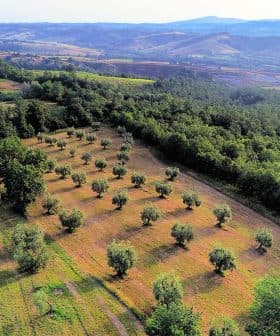Investing in the Future of Olive Oil in Argentina
Luis Feld, the founder of Alma Cuyana S.A., has created a successful olive oil business in Argentina despite the country’s declining olive oil production. The company, Cuna de Olivares, exports its products internationally and is now expanding into the domestic market.
By Sarah Schwager
Olive Oil Times Contributor | Reporting from Buenos Aires
Cuna de Olivares literally translated means “Cradle of olive groves”.
This image of rocking the olives in a cradle reflects the care that Luis Feld, founder of the Argentinean olive oil company, says he has for his products.
“I can’t say which oil is my favourite,” he said when quizzed on the topic. “That’s like asking which one of my children I love more. Each of these varieties has its particularities that make it unique and special.”
Mr. Feld is the president and founder of Buenos Aires-based company Alma Cuyana S.A. and its trademark Cuna de Olivares.
The businessman, who specializes in the development of agro-business investment and foreign trade, was formerly president and founder of Bodegas (wineries) Terranova, and before that, president and founding partner of Celucat Argentina, a subsidiary of Klabin Group, a leading Brazilian paper company.
He decided to make a personal dream come true by buying an olive grove estate for producing olive oil and the first trees were planted in 2005 in Mendoza and San Juan in the Cuyo region, the most well-known olive oil producing region in South America.
The oil, marketed under the brand Vero Andino, was first rolled out to China in the second half of last year.
“I acquired the global market knowledge through my business in the cellar,” he said. “It was a project that would allow me to have an income for life and leave my family a secure income and capital. The structure of the enterprise came much later, after finding people who agreed with my vision and were willing to invest in agribusiness in the country for the medium and long term.”
The business is unique in that its approach to the ancient art of olive making is driven by absentee investors and financial managers.
Cuna de Olivares develops the plantations and manages the project while new partners are brought into the company’s trust fund. The company – the first to develop olive trust funds in Argentina – offers investors “a capital increase in the mid and long term at a high capitalization and profitability rate” according to its literature.
It was a risky venture for the entrepreneur. Argentina’s olive oil production has been on a downwards slope since mid last century. Mr Feld says this is his greatest satisfaction – transforming a dream that many told him was impossible into a reality.
“I have joined the many dreamers from diverse geographical locations who believe in the potential for agribusiness in Argentina and in our ability to achieve it,” he said.
Up until the 1930s, Argentina was a huge consumer of olives and olive oil to satisfy the tastes of those people still lingering from the colonial period.
Changes in both Argentina’s economy and the international olive oil market in the following decades brought about a sharp reduction in the amount of land dedicated to the cultivation of olive trees.
By the 1970s, an increase in the consumption of cheaper oil mixes such as sunflower oil and corn oil saw a decline in olive oil sales, with plantings removed in masses.
And so the 1990s arrived with olive crops spanning 33,000 hectares, with an average yield of just 3500 kilograms per hectare, or 110,000 tons all up. World production is around 2.7 million tons per year. Since then, progressive droughts in the Mediterranean Basin, changes in consumption patterns and promotion of olive oil have led to a revival of olive oil production in Argentina, which is now the principal olive oil producer in South America.
The quality of Argentinean products means international export has grown rapidly. Cuna de Olivares exports its products to China, Brazil and Mexico. This year it will also add its products to the domestic market, with Vero Andino to be distributed throughout local supermarket chains next month (August).
Mr Feld says he is not worried about the state of the industry in Argentina at the moment. “The world olive market is in full development and generating major changes,” he said. “World consumption of olive oil is growing at a rate of 4% per year and Argentina produces only 1% of world production.”
He says while the price of olive oil will always fluctuate on the world market, their projects span many years, and so profitability in the long term is not affected. “At the national level, while small and medium producers suffer the consequences of not being integrated, generally industry expectations are very good in the medium and long term, especially for medium and large producers that have an industrial unit and split production, adding exporting and brand value,” Mr Feld said.
He says despite the fact that the olive growing season is relatively short, it does not affect the company. As an integral olive venture its revenue comes from all links in the chain – from the nursery to marketing and branding.
But he believes a strong campaign is needed to lift consumption in the domestic market where cheaper oils such as sunflower are preferred. “The average consumption of one liter of olive oil per capita in Argentina would mean about 40,000 tons per year, which no current domestic production would reach.”
Olive oil has been a part of Argentinean history since its beginnings. Olive oil was used not just in the kitchen but also in medicine, energy, religion and war. “Making olive oil is not only good business, it is returning to our immigrant roots that bind us to the production of noble foods and the creation of a new history for our children who may follow in our footsteps in this endeavor, which will surpass 100 years thanks to the generosity of the olive,” Mr Feld said.
By sticking to its roots, the company does not dabble in adulterated olive oil as some companies have been known to do to keep a consistency in the flavor. Cuna de Olivares works only with extra virgin olive oil and its varieties – Arbequina, Frantoio and Coratina.
That care is reflected across the company. Alma Cuyana S.A., which employs more than 100 families in the Cuyo region, has also taken actions to improve the working environment at its properties. “In Mendoza, for example, we are assessing the construction of an outpatient building to provide basic medical services to our staff and their families,” Mr Feld said.
At its commercial offices in Buenos Aires and Mendoza, the company employs 50 people full-time and more than 70 temporarily. Eight professionals and 42 workers, many of who are specialized and trained for specific tasks, man the plantations.





